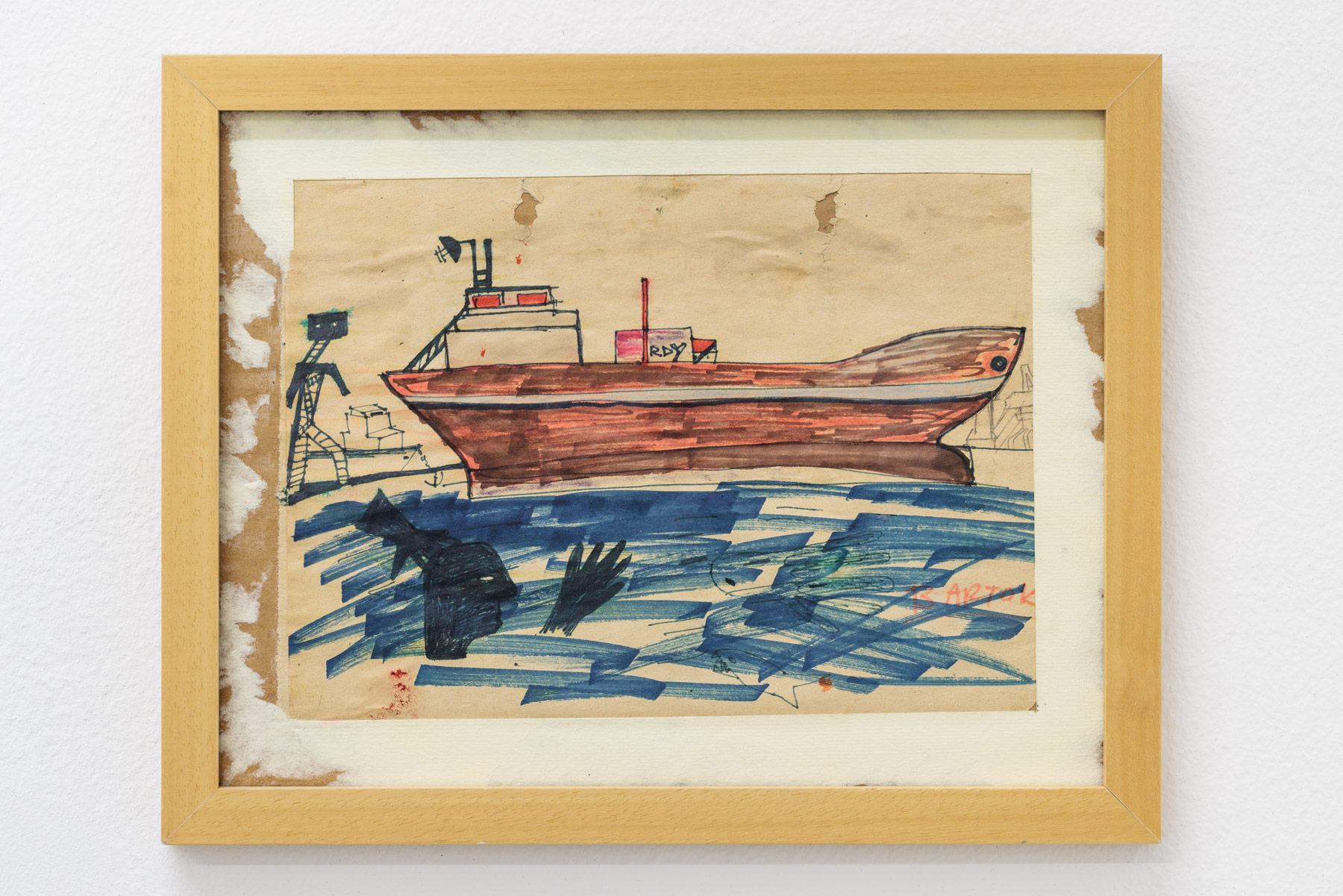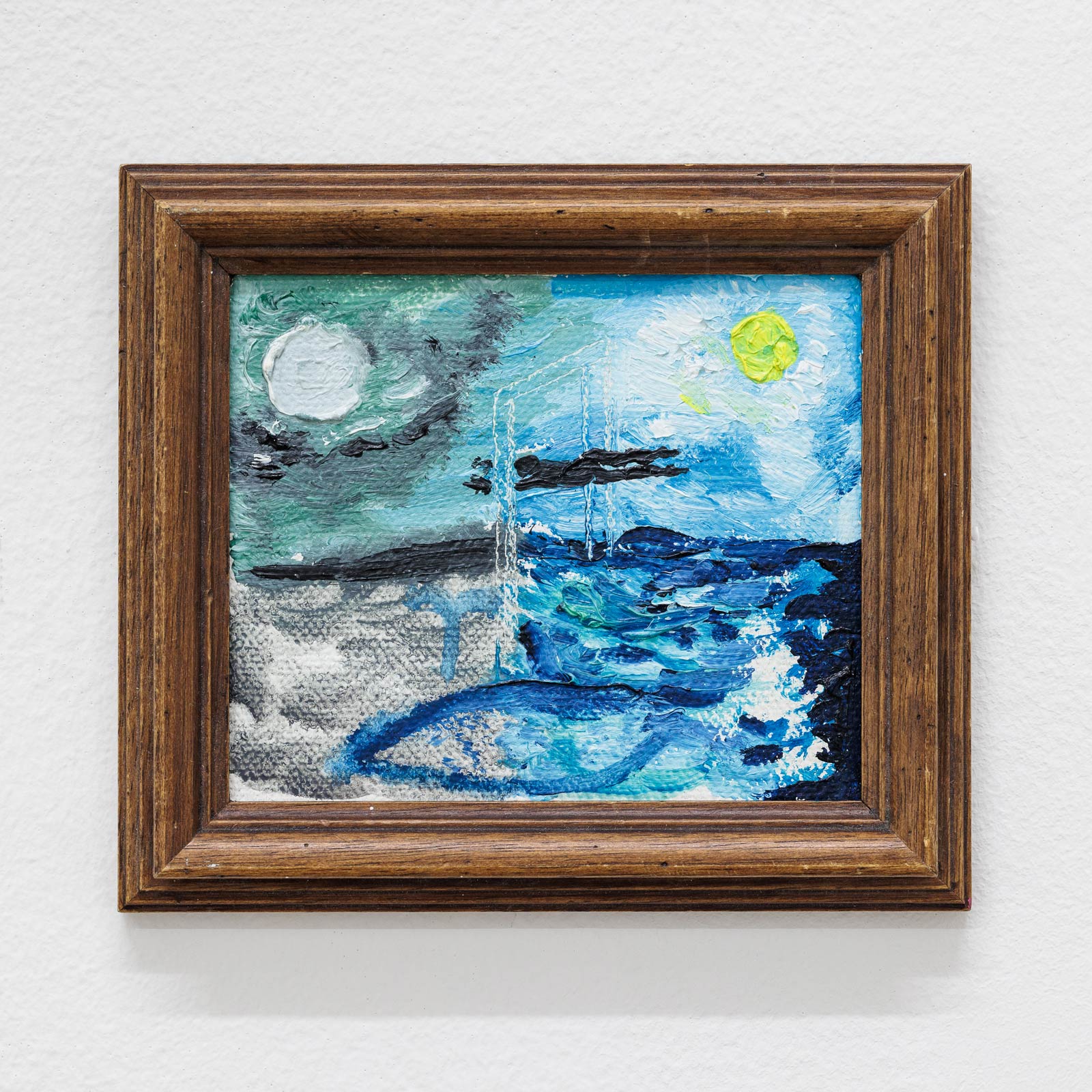Exhibition view, Galerie Martin Janda, 2024
Photo: kunst–dokumentation.com
Galerie Martin Janda is part of curated by 2024 — Untold Narratives, the gallery festival with international curators in Vienna. The exhibition FRICTIONS, with works by Nilbar Güreş, Devin T. Mays, Martha Rosler, Roman Signer and Fredrik Værslev, is curated by Dieter Roelstraete and runs from September 13 until October 19, 2024.
Curator and Artist Talk on Fr, 13.09. at 6 pm, with curator Dieter Roelstraete and artist Devin T. Mays.
At the center of FRICTIONS, the viewer encounters one of the most readily recognizable, ubiquitous objects known to humankind, on a par with the traffic cone or (these aren’t random examples) monobloc garden chair: a wooden shipping pallet — or rather, an awful lot of them.
On the ground floor, wooden shipping pallets provide the primary building blocks for a provisional sculptural installation by Devin T. Mays (*1985, lives and works in Chicago and Houston), for whom the pallet has become a signature material that grounds the artist’s practice squarely in the historical continuum of some of sculpture’s most basic formal questions – one such query being, for example: can pedestals and/or plinths be part of a sculpture? Does one ship shipping pallets? How much détournement, in the Situationist sense of the term, makes a work of art? Or: is an objet ever really, truly trouvé? (Etcetera.) In the basement, Fredrik Værslev (*1979, lives and works in Oslo) has appropriated what look like a handful of wooden pallets and turned them into “canvasses” for his caustic, workaday experiments in high-end painterly abstraction veering between the forbiddingly minimal and gaudily maximalist. Flipping them on their side and mounting them some distance from the wall, these splattered wooden structures — Værslev refers to these works as his “Garden Paintings” — inevitably start resembling fences more than anything else (borders, boundaries, confines). In other words: what inside the ground floor gallery is still fairly straightforwardly legible as a commentary, possibly, on the global economy’s tireless fever-dream of the unceasing, frictionless flow of “goods” across land and sea — the marvel of motion — acquires a darker cast down below, reminding us of the fact that people (increasingly!) do not move around the globe quite as freely as the fruits of their labor.
An admittedly rather crude and rudimentary cause for coupling two very different art practices, in other words — one that clearly chooses “form” over “content” — morphs into grounds for a multifaceted, meandering reflection on some of the defining paradoxes of our time: an era that insistently demands the constant mobilization (trading, trafficking) of every-thing, yet which has turned the very notion of “transit” into an ordeal of inescapable stasis — of human sameness amidst the coming and going of matter and “stuff”. New and old works by Nilbar Güreş (*1977, lives and works in Naples) and Martha Rosler (*1943, lives and works in New York) consider the human cost of our expectation that “all that is solid melts into air”, as Marx and Engels once memorably characterized one of capitalism’s cardinal “virtues”. Rosler has long been an avid chronicler of the daily, humdrum human drama of coming and going, as is attested in a selection of photographic works both old and new (plus ça change), while Güreş’ works confront the epic of diasporic living and migration — foundational, recurring motifs in the oeuvre of an artist hailing from one of the world’s greatest port cities, the capital of longing that is present-day Istanbul. Two photographic works by Roman Signer (*1938, lives and works in Sankt Gallen) documenting the Swiss maverick’s signature ludic experiments with energies and locomotions of all types recall an alternate history of movement that is integral to the fundamental promise of art as the “experimental exercise of freedom”, as the Brazilian art critic Mario Pedrosa once memorably called it: an exercise in dreaming of escape.
In the opening paragraph of her curatorial meta-statement guiding the present edition of the curated_by gallery festival, Noit Banai observed: “we are in the third decade of the twenty-first century, and despite — or because of — claims that globalization is at a record high, there is a drive by various state and non-state actors and institutions to capture archives and tell mono-dimensional stories” — to close borders and “arrest developments”. Aspiring, in contrast, “to remain in the borderlands”, artists, however, forever keep both things and people moving — in a constant state of motion as well as emotion: flux and flow are eternal, all friction notwithstanding.
Text: Dieter Roelstraete

Martha Rosler, Lexington Avenue Station, New York, September. From the series: Ventures Underground (1990–present), 2003
C-print, edition of 6 + 2 A.P., 62.2 × 101.6 cm

Nilbar Güreş, Bartok, 1998
Felt-tip-pen, coloured pencil on paper, 21 × 26.5 cm

Nilbar Güreş, Two Moons two Suns two Waters, 2024
Oil on canvas, framed, 15.5 × 17.5 cm